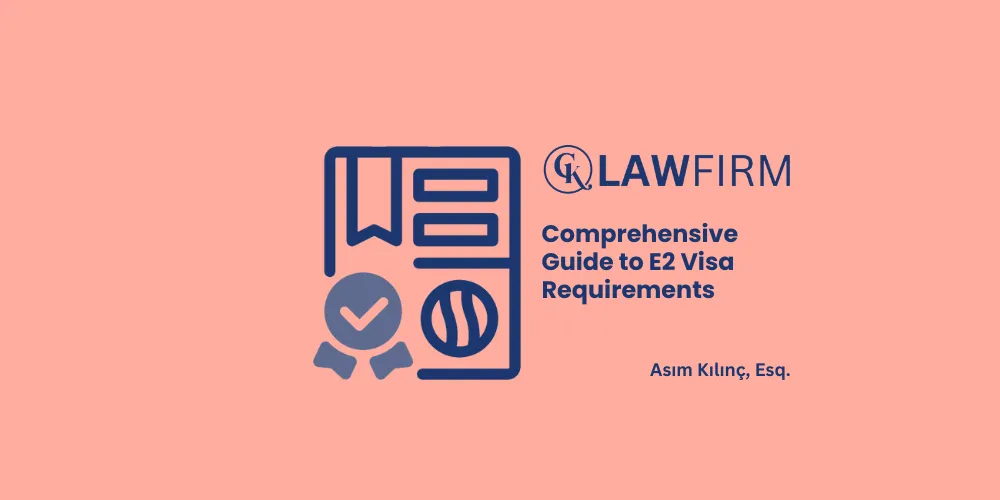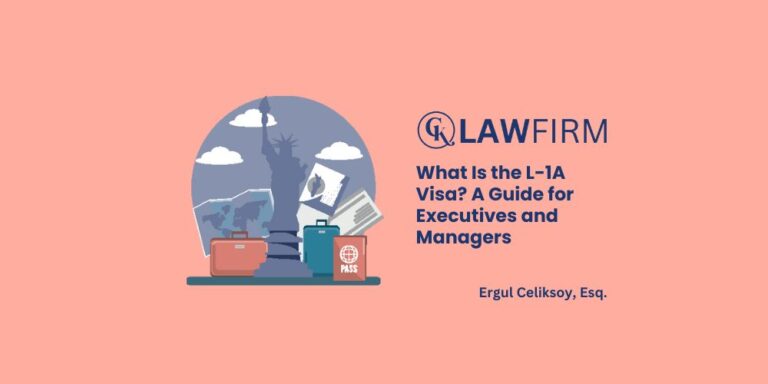Schedule an Appointment with Our Attorneys Now

Comprehensive Guide to E2 Visa Requirements
Asım Kılınç, Immigration Attorney, CK Law Firm
Are you considering starting a business in the United States? The E2 visa provides an exceptional opportunity for entrepreneurs and investors from treaty countries to live and work in the U.S. In this comprehensive guide, we’ll address the most frequently asked questions about the E2 Investor Visa, including its E2 visa requirements, benefits, and challenges. Whether you’re looking to invest in an existing business or start a new one, this blog has you covered. In this article, the topics I will touch upon with the E2 investor visa conditions are as follows:
- What are the E2 Investor Visa Requirements?
- What is the Lowest Investment for an E2 Visa?
- E2 Visa to Green Card
- What is the Approval Rate for the E2 Visa?
While answering these questions, I will also address the sub-headings that are curious. However, as in every visa application, you can contact us via the official website of CK Law Firm to get support from us in E2 visa application. You can also always reach me on my LinkedIn account.
What are the E2 Investor Visa Requirements?
The USCIS outlines 9 criteria to qualify for the E2 visa. These criteria ensure that applicants contribute to the U.S. economy through substantial and active investments. Below is a detailed explanation of these criteria:
- Nationality: Applicants must be citizens of a country with which the U.S. maintains a treaty of commerce and navigation. The list of eligible countries can be found on the USCIS website.
- Substantial Investment: The investment amount must be significant in relation to the total cost of the business. While there is no fixed minimum, most applicants invest between $100,000 and $200,000.
- Investment at Risk: The funds must be committed and subject to partial or total loss if the business does not succeed. Passive investments, such as real estate purchases, do not qualify.
- Active Business Operations: The investment must be directed toward an active, for-profit enterprise. Passive income-generating investments, such as stock portfolios, are not eligible.
- Ownership and Control: The applicant must own at least 50% of the enterprise or possess operational control through a managerial position or other means.
- Marginality: The business cannot be marginal, meaning it must generate more than enough income to support the investor and their family or create significant economic impact through job creation.
- Intent to Depart: Applicants must demonstrate an intent to leave the U.S. when their E2 status ends. The visa does not lead to permanent residency automatically.
- Legal Source of Funds: The investment capital must be lawfully acquired and traceable. This ensures the legitimacy of the financial resources used.
- Job Creation: While not explicitly required, businesses that create jobs for U.S. workers are more likely to receive favorable consideration.
These criteria are crucial for ensuring that the E2 investor visa program supports the U.S. economy while providing opportunities for qualified investors.
Who Qualifies for an E2 Visa?
To qualify for the E2 visa, applicants must meet these criteria:
- Be a national of a treaty country.
- Have committed or be in the process of committing the required investment.
- Demonstrate that the business is not marginal and will generate enough income to support the investor and their family.
What are the Disadvantages of an E2 Visa?
Despite its many advantages, the E2 visa has some limitations:
- Non-Immigrant Status: It doesn’t directly lead to a Green Card.
- Renewal Dependence: The visa must be renewed periodically, and approval is contingent on the business remaining active.
- Limited Nationality Eligibility: Only nationals of treaty countries can apply.
- Restricted Pathways: Transitioning from an E2 visa to a Green Card often requires additional investment or employer sponsorship.
E2 Visa to Green Card
While the E2 visa doesn’t offer a direct path to permanent residency, it can be a stepping stone. Popular routes include:
- EB-5 Investor Visa: Transition by increasing your investment to meet EB-5 requirements.
- Employment-Based Green Cards: Seek sponsorship through employment or business growth.
What is the Lowest Investment for an E2 Visa?
While the E2 visa doesn’t have a fixed minimum investment amount, successful applications typically involve at least $100,000. However, smaller investments may be acceptable if they are substantial enough to cover the costs of the business and ensure its success.
- E2 Visa Businesses for Sale: Buying an established business is a popular option for investors, as it often simplifies the application process and ensures immediate economic impact.
What is the Approval Rate for the E2 Visa?
The E2 visa approval rate is relatively high, often exceeding 85% globally. Approval depends on the completeness of your application, the viability of your business plan, and compliance with all USCIS requirements.
Related Visas: Comparing E1, E2, and M1 Visas
- E1 Visa: Focused on trade between treaty countries and the U.S.
- E2 Manager Visa: For managerial employees of businesses owned by E2 investors.
- M1 Visa Requirements: Designed for vocational or non-academic students, not related to investment.
Yes, we have come to the end of a curious topic. I should mention again that getting support in visa applications is important for the smooth and fast progress of the process. At this point, you can always contact us through our website or through my LinkedIn account to get support from me. You can also always ask us any questions you may have by adding your questions in the comments section of this blog.






